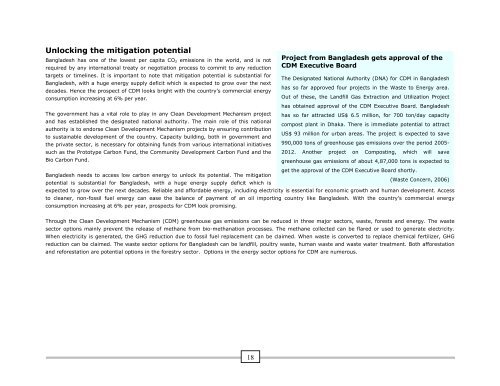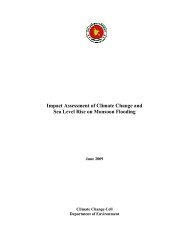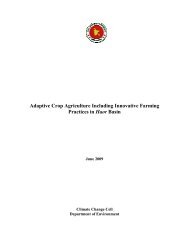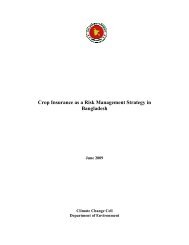CLIMATE CHANGE AND BANGLADESH
CLIMATE CHANGE AND BANGLADESH
CLIMATE CHANGE AND BANGLADESH
Create successful ePaper yourself
Turn your PDF publications into a flip-book with our unique Google optimized e-Paper software.
Unlocking the mitigation potential<br />
Project from Bangladesh gets approval of the<br />
CDM Executive Board<br />
Bangladesh has one of the lowest per capita CO 2 emissions in the world, and is not<br />
required by any international treaty or negotiation process to commit to any reduction<br />
targets or timelines. It is important to note that mitigation potential is substantial for<br />
The Designated National Authority (DNA) for CDM in Bangladesh<br />
Bangladesh, with a huge energy supply deficit which is expected to grow over the next<br />
has so far approved four projects in the Waste to Energy area.<br />
decades. Hence the prospect of CDM looks bright with the country’s commercial energy<br />
consumption increasing at 6% per year.<br />
Out of these, the Landfill Gas Extraction and Utilization Project<br />
has obtained approval of the CDM Executive Board. Bangladesh<br />
The government has a vital role to play in any Clean Development Mechanism project has so far attracted US$ 6.5 million, for 700 ton/day capacity<br />
and has established the designated national authority. The main role of this national<br />
compost plant in Dhaka. There is immediate potential to attract<br />
authority is to endorse Clean Development Mechanism projects by ensuring contribution<br />
US$ 93 million for urban areas. The project is expected to save<br />
to sustainable development of the country. Capacity building, both in government and<br />
the private sector, is necessary for obtaining funds from various international initiatives 990,000 tons of greenhouse gas emissions over the period 2005-<br />
such as the Prototype Carbon Fund, the Community Development Carbon Fund and the 2012. Another project on Composting, which will save<br />
Bio Carbon Fund.<br />
greenhouse gas emissions of about 4,87,000 tons is expected to<br />
get the approval of the CDM Executive Board shortly.<br />
Bangladesh needs to access low carbon energy to unlock its potential. The mitigation<br />
(Waste Concern, 2006)<br />
potential is substantial for Bangladesh, with a huge energy supply deficit which is<br />
expected to grow over the next decades. Reliable and affordable energy, including electricity is essential for economic growth and human development. Access<br />
to cleaner, non-fossil fuel energy can ease the balance of payment of an oil importing country like Bangladesh. With the country’s commercial energy<br />
consumption increasing at 6% per year, prospects for CDM look promising.<br />
Through the Clean Development Mechanism (CDM) greenhouse gas emissions can be reduced in three major sectors, waste, forests and energy. The waste<br />
sector options mainly prevent the release of methane from bio-methanation processes. The methane collected can be flared or used to generate electricity.<br />
When electricity is generated, the GHG reduction due to fossil fuel replacement can be claimed. When waste is converted to replace chemical fertilizer, GHG<br />
reduction can be claimed. The waste sector options for Bangladesh can be landfill, poultry waste, human waste and waste water treatment. Both afforestation<br />
and reforestation are potential options in the forestry sector. Options in the energy sector options for CDM are numerous.<br />
18





